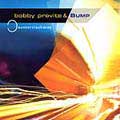
Previte's bands of the mid '80s produced some of the more exciting and creative music on the NYC jazz scene of the time, taking a fresh approach to compositional aspects of the music with winding, surging works wherein what initially seemed to be the opening riff developed into a multi-faceted theme in ever-expanding variations. He took a respite from this area for the last several years, concentrating on jam-oriented bands working in an electric Miles arena often with, for this listener, less than inspired results. "Counterclockwise" finds Previte returning, to some extent, to that earlier territory, fronting a solid group that includes Steve Swallow, Wayne Horvitz, Marty Ehrlich (on tenor exclusively here) and Curtis Fowlkes. In his "thanks" section, Previte lists a handful of rock drummer warhorses (Mitchell, Baker, Palmer - Carl, one assumes - , Bonham, Starr) and indeed his drumming here has decidedly rockish overtones, even on the more purely jazz-oriented numbers.
The title track struts along proudly, the trombone and piano providing deep vamps for some Ehrlich wailing, the leader bashing away like a 15 year-old Zeppelin fan who's just heard Mingus. This is good and bad; good for the reckless sense of enthusiasm he brings, bad, well, for all the heavy-handed pounding. One assumes this is an explicitly understood tack being taken by Previte, an attempt to bring the idiosyncratic energy generated by certain "classic rock" drummers into a different arena. Whether it succeeds or not may simply depend on how much a given listener deems that such a ploy was necessary, or even useful, in the first place. His themes are infectious enough that there were times when I found myself actually wishing to dispense with the drummer altogether; after all, with Swallow in the bass chair, there's more than enough rhythmic subtlety on hand. At other times, Previte manages to inject enough brutal mayhem that on a purely fun level, it works rather nicely. But contrary to some of his prior work, the themes often stay put throughout, serving as the basis for the solos rather than developing in any significant way. This can work out fine if the theme in question is inherently fascinating but when, as on several of the "telephone exchange" pieces here (those with titles consisting of three digits followed by "-SOUL") the riff is a bit on the plodding side and quickly wears out its welcome. In sum, a mixed bag: some glimmers of rich beauty, some nice soloing (much fine ensemble playing) but often weighed down by the album's central conceit, that basic rock drumming and post-Mingusian composition and improv can peaceably co-exist.
Comments and Feedback:



More Recent Reviews, Articles, and Interviews @ The Squid's Ear...


|

